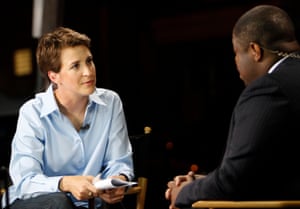The G2 interview
Rachel Maddow
Rachel Maddow on her critics: ‘Your hatred makes me stronger. Come on! Give me more!’
The MSNBC host’s show has become a safety blanket for many US progressives. She discusses her demonisation by the right, tackling the president’s lies – and coming out at 17

Photograph: Ali Smith/The Guardian
Rachel Maddow, the US TV host, has a message for her critics: “Bring it. Your hatred makes me stronger. Come on. Give me more. Give me more. I love it!”
That is just as well, given the way she has polarised viewers in the past few years. Maddow, 46, has presented her primetime show on MSNBC, a 24-hour cable news channel, on weeknights since 2008. If most cable news and social media is fast food, she tries to rustle up a three-course meal: sensible, sober, sometimes painfully detailed and replete with oblique references to half-forgotten politicians of yesteryear. Since Donald Trump’s rise in 2016, however, The Rachel Maddow Show has become a nightly safety blanket for many progressives who identify with the “resistance”.
“Her figure has ascended, in the liberal imagination, from beloved cable news host to a kind of oracle for the age of Trump,” the New York Times Magazine noted recently, describing her show as the “gathering place for a congregation of liberals hungering for an antidote to President Trump’s nihilism and disregard for civic norms”.
The view from the right is rather different. Maddow is demonised as an avatar of the “liberal elite” and “Trump derangement syndrome”. Even ideological fellow travellers worry that she is “strident” and “shrill”. She dedicates her new book, Blowout, which explores the pernicious influence of the global oil and gas industry, “to the bots and trolls, all of you, with love”.
There is, of course, much more to Maddow than her screen persona. A practising Catholic as well as the first openly gay host of a US primetime news programme, she has suffered cycles of depression all her life and enjoys fishing, shooting and reading Robert Harris historical yarns. She is also, it turns out, a lot of fun.

At a receptionist’s desk outside her understated office in New York’s art deco Rockefeller Center sits a decaying lifesize waxwork of the former Republican president Dwight Eisenhower. Inside, a Russian doll bearing Vladimir Putin’s face rests on a bookcase. Crutches are propped up in a corner “as a talisman” – she broke her ankle last year in a fishing accident.
With bookshelves overflowing – the Mueller report, examining Russian interference in the 2016 election, lies on a crate below – and ideas scribbled on whiteboards, it is the den of a promiscuous intellect. Maddow, dressed in a black jacket, turned-up jeans, camo trainers and her trademark black-rimmed specs, spots my voice recorder – a vintage Tascam device that resembles a Taser – and snaps a photo of it with her phone, lest it be useful to her team.
The media will be on trial in November’s presidential election. Many observers fear a repeat of 2016, when Trump’s vulgar antics gained endless air time, pundits were insufficiently critical and even serious newspapers appeared to treat baseless allegations against Hillary Clinton as if they were equivalent to Trump’s financial and sexual transgressions.
The day after we speak, Maddow demonstrates another way of working – and gains the biggest ratings win of her career – when her interview with a key figure in Trump’s Ukraine scandal pulls in 4.5 million viewers, beating all the competition. Her explosive conversation with Lev Parnas, an associate of Rudy Giuliani, Trump’s lawyer, is a timely riposte to the claims that she is too partisan, polemical and fixated with international conspiracy theories. It makes the political weather for several days.
“I think part of the reason Trump got so much ‘earned media’ during the 2016 campaign is that he was so transgressive,” Maddow says. “It was a relatively rational newsworthiness assessment to put a camera on him at all times, because there was a reasonably good chance he was going to do something shocking, wrong, transgressive or unbelievably disruptive.
“But that also dovetails with the question of whether or not his falsehoods and reversals and self-contradictions and professed ignorance got the critical coverage that they deserved. When nobody’s expecting you to tell the truth, you telling a lie isn’t news. If Barack Obama got up and said something that was proveably false or maybe not the whole truth, you’d have the whole media, not just Fox News, going crazy for a month at a time. Donald Trump’s mendacity has never been notable. It’s just been baked in.”
Trump made more than 16,000 false or misleading claims in his first three years as president, according to the Washington Post – and that number is likely to accelerate as the election hots up. But he is undeniably good for ratings and clicks. Media outlets will have to choose whether or not to broadcast his campaign rallies and interview his surrogates unfettered, as well as how far to go in editing, fact-checking or simply “no-platforming”.
“We went through our own transformation fairly early on when I realised that I couldn’t put Trump administration officials on the air as guests because they did not tell the truth,” says Maddow. “Having to clean up after your guest is a sort of ‘fool me once’ thing, like: ‘When I told my audience that you were somebody worth listening to because you had something to contribute to our understanding of the world, I was wrong. I’ve goodnighted you. I won’t invite you back.’”
She adds: “I can play the tape of the president saying something that’s not true and then clean up after him – but then I’ve also just played the tape of him saying something not true, and maybe that’s more compelling to you and more of what you remember than the part where I corrected it.
“I feel like there’s a responsibility level there. So we’re not going to give people a platform who are lying to the public. But I’m assuming everybody else in the media is going through that same thing.”

(from left) Bernie Sanders, Pete Buttigieg, Cory Booker and Tom Steyer after moderating a debate between Democratic presidential candidates on 20 November. Photograph: Brendan McDermid/Reuters
Observers of all political stripes have taken Maddow to task for her coverage of Trump’s alleged collusion with Russia. Presidential cheerleader Sean Hannity, whose Fox News show airs in direct opposition, has called her “the chief conspiracy theorist”. In a critique of her handling of a 35-page dossier on the subject compiled by the former British intelligence officer Christopher Steele, Erik Wemple of the Washington Post wrote: “She was there for the bunkings, absent for the debunkings – a pattern of misleading and dishonest asymmetry.”
But Maddow, whose new book was inspired by Putin’s motives for attacking US democracy, describes some of the criticism as dishonest and makes no apologies for being obsessive, especially since there is every prospect of Putin trying again this year. “Russia interfered in the 2016 election to try to elect Donald Trump, and Donald Trump got elected and he is weirdly and irreversibly supplicant toward Russia and Putin. Like, OK, I’m going to cover that,” she says. “I don’t care what anybody says about me. I don’t play requests and I don’t worry about the criticism. If we get something wrong, I’ll correct it, but, in the absence of that, the criticism for focusing on real news stories that bother people – that’s what I get paid to do.”
You have to grow a thick skin, she says. “Getting a show on the air, even all these years in, is like merging on to the freeway at 80 miles an hour at night in a rainstorm with no headlights and no windshield wipers and a bunch of semi-trucks coming up right behind me. Somebody telling me that they don’t like the colour of my car? I am not focusing on you! I’ve got a job to do here.”
That freeway sounds terrifying and yet also an adrenaline rush. The Trump presidency is a liberal’s worst nightmare and a dream for many journalists. Jim Acosta, the chief White House correspondent at Maddow’s rival network CNN, has said: “I’m having the time of my life right now. This is the biggest story of my life. I’m like a kid in a candy store.” So, despite the daily horrors, is Maddow secretly enjoying this?
“I don’t know if ‘enjoy’ is the right word, but I do have the best job in the world,” she says. “I talk to a lot of people who feel strongly about what’s going on in the world, whether they’re in public affairs or they’re just concerned citizens who pay attention to what’s going on. People say: ‘Don’t you find it incredibly demoralising? How do you think about all this stuff all day?’ I feel the opposite. If you’re at all engaged with what’s going on in the country and in the world, you have to be concerned. But my job, what they actually pay me to do, is to read the news all day long and do original reporting and try to figure out what is and isn’t reliable information. I feel like I’m doing mental health work all day long.”
Maddow, who grew up in a small town in California, has previously worked as a labourer, a messenger, a waitress and a bucket washer at a coffee-bean factory. “I am not a planner. This definitely wasn’t like the thing that I set my mind toward and then I put together all the pieces to get there. I had much more of a drunken stumble through my career than you might expect, but now that I have landed here, I value it.”
She came out at Stanford University by posting an open letter inside every bathroom stall in her dormitory announcing that she was a lesbian, an incident that was reported in the student newspaper. “Classy, right? I was 17. Why did we do anything? I don’t know. I haven’t thought about it in a long time. I think that I was very full of myself and thought that this was a very important piece of news that everybody needed to have. And I also liked needling people and confronting them in ways that I thought would be both funny and self-aggrandising. I don’t look back on that with particular pride.”
Her conservative Catholic parents were stunned. “I didn’t handle it well. I wasn’t very respectful and didn’t have much emotional peripheral vision in terms of the way that my actions would affect others, which I think was a product both of my ego and self-regard and where I was in my own development at that time. They had a really hard time at first and we had a few rocky years.
“But now my parents could not be more supportive. I’m Catholic and I come from a Catholic family and the church’s teachings on this have been a factor. But, ultimately, where we’ve ended up is at the best possible place and I am super-blessed to have the support of my whole extended family.”

Maddow has been with her partner, Susan Mikula, a photographer, for two decades. Counterintuitively for a “liberal icon”, their first date involving throwing tomahawks and firing guns at a “Ladies Day on the Range” sponsored by the National Rifle Association, of which Mikula’s sister is a lifetime member.
Maddow, who does not own a gun, says cheerfully: “Going to gun ranges is fun. Have you ever done it? You should go. You go and you pick which gun you want, you pay to use the time and they show you how to use it and you learn about the gun and then shoot a target. And then you leave the gun there and you go home.
“Shooting sports is, I think, an interesting way to demystify guns, particularly if you’re engaged in reporting on or commenting on the politics and culture around guns stuff. I don’t have any problem with that at all. It’s super-fun. Susan, it turns out, is a really good shot, which was a shock.”
It says something about the times that Maddow’s ease with guns is more shocking to some than her sexuality. The CNN anchors Don Lemon and Anderson Cooper both came out almost a decade ago. Same-sex marriage was legalised in 2015. Now Pete Buttigieg, the former mayor of South Bend, Indiana, is bidding to become the first openly gay US president. Nothing, however, should be taken for granted. Under cover of myriad distractions, the Trump administration is attacking gay and transgender rights.
Maddow reflects: “Civil rights and social justice issues often advance in what I describe as a sawtooth pattern of progress, where you take two steps forward, one step back. It’s work that doesn’t do itself. It has to be done by human beings who are working in a concerted way, in a way that is nimble and that appreciates the potential for backsliding and even backlash.
“That’s the one piece of this that I feel like we’re learning more and more: that civil rights aren’t a given. They’re asserted and protected – or assailed.”
Blowout by Rachel Maddow is published by Bodley Head. To order a copy for £17.60 (RRP £20), go to guardianbookshop.com or call 0330 333 6846. Free UK P&P over £15; online orders only. Phone orders minimum P&P of £1.99.
Source: Elections - theguardian.com


